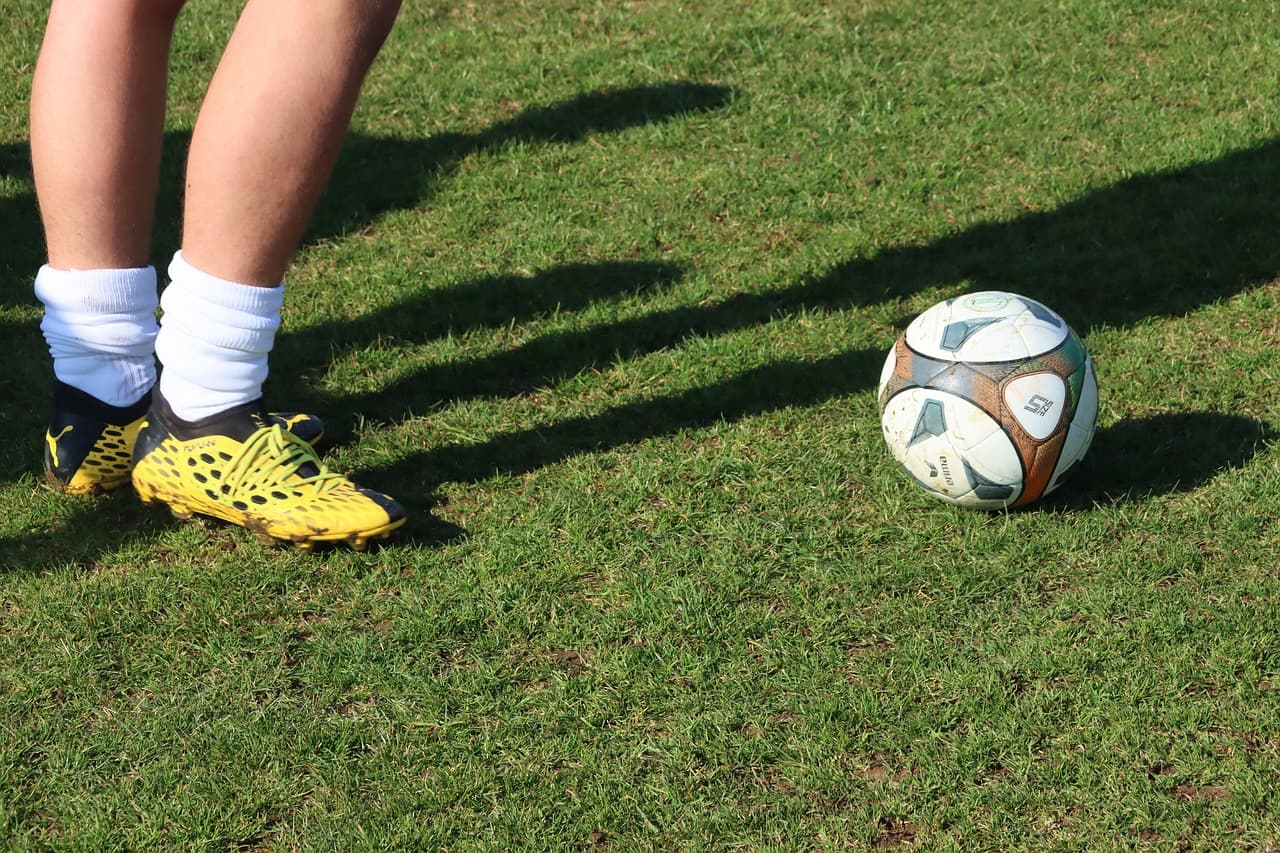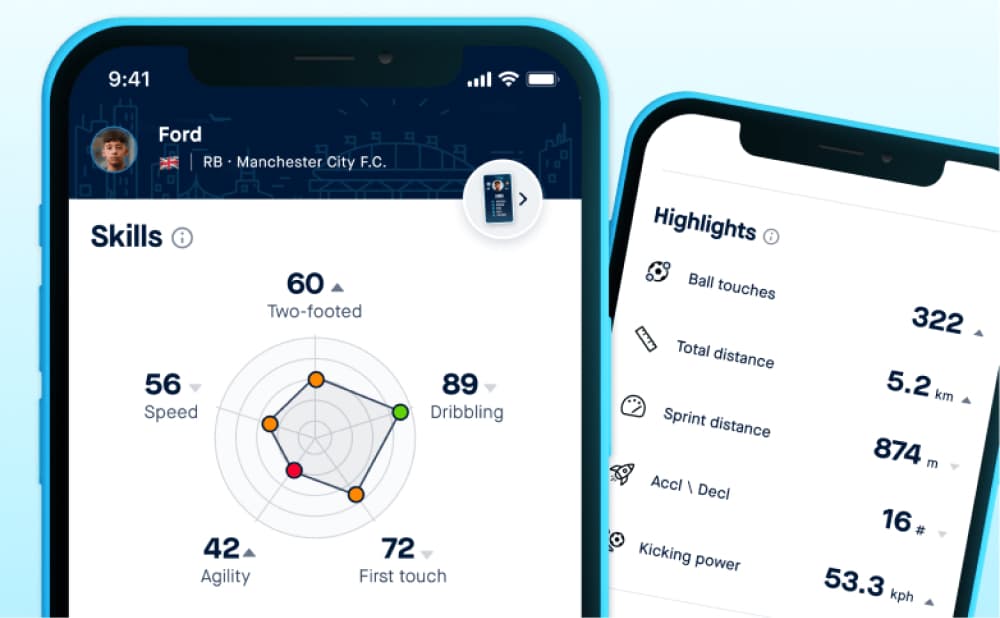If you love football and want to be a professional, you must grab the attention of a football scout. However, getting scouted isn’t usually straightforward: it requires dedication, diligence, and determination.
You must impress the football scout in many ways—including physical fitness, technical skills, and mindset. Likewise, you must be in the right place at the right time; luck certainly plays a small factor.
Scouts attend matches in a local club or weekend league, but it’s not uncommon for them to attend training sessions. If they like what they see, they’ll invite you to a football trial, enabling you to showcase your talent.
The chances of being scouted are small with 1.5 million young football players in the UK, but you can maximize your odds by following these tips:
Is it hard to get scouted in football?
It is hard to get scouted in football, and only a fraction of aspiring football players make it to professional levels. In the UK, an estimated 0.012% of boys who play youth football in academies sign professional contracts with Premier League clubs. This shows the intense competition among talented players.
Furthermore, even when leading clubs scout young talent for their academies—such as Manchester United—data suggests only 97% of players play a minute of top-flight football.
It’s a major challenge, but you must find the best way to get scouted.
5 Tips To Stand Out To Scouts
With such high competitiveness, you must be at your absolute best—at all times—for football scouting to find you.
Here are five of the best ways to catch the eye of a football scout:
Work hard! Start early!
How old do you have to be to get scouted for football? The answer is, the earlier the better. Most football players are scouted in their early teens (or earlier). Join a club at a young age (or sign up your kids) to be instantly ahead of the competition. Once a club member, take advantage of the training and advice given.
Join a Sunday League Team
Scouts regularly attend Sunday League games, so joining a Sunday League team is an effective way to get noticed.
Sunday Leagues offer regular competitive matches, providing the experience to develop your skills and gain exposure.
To stand out during football scouting, always perform at your best, maintain peak physical fitness, and treat every game with professionalism.
Be Yourself
Be yourself during training sessions and games. Don’t put on an act to impress – scouts quickly see through that.
Remember – there’s no “I” in “Team”.
No one enjoys playing football with selfish arrogant players who hog the ball to steal the limelight. Scouts want football players who are able to fit into existing teams.
Show them you can by encouraging your teammates throughout the game.
Show up on time for training sessions. Coaches can’t create game strategies when squad members don’t turn up or are late. Scouts definitely talk to team coaches about the attitude of prospective players!
Off the field, tactics are important too
Professional football clubs have images to project and team members are part of that image both on and off the field.
Show the scout you can communicate respectfully with everyone whether it’s teammates, coaches, helpers, or supporters.
Guard any social media profiles carefully as scouts will check them out. Don’t post anything you may regret in the future.
What do football scouts look for in a player?
Football scouts look beyond statistics and highlight reels to identify top talent. They look at a blend of physical attributes, technical skills, mental acuity, and intangible qualities.
Scouts evaluate speed, agility, strength, and endurance as key physical traits.
Technical skills such as ball control, passing accuracy, shooting power, and tactical awareness are scrutinized.
Mental attributes like decision-making under pressure, spatial awareness, and game intelligence are also crucial.
Additionally, scouts assess intangibles such as leadership potential, work ethic, coachability, and consistent high-level performance.
Scouts will notice you if you can portray these abilities on the pitch. Let’s look deeper in the 6 fundamental areas a scout will evaluate when judging a player:
Technical Abilities
Good team and personal skills are vital but without technical ability, you’ll never reach your football potential.
Scouts want to see that you can manipulate the ball with finesse, kicking, dribbling, passing, and shooting with precise control and total confidence.
Tactical understanding and awareness
Scouts also look for tactical understanding, knowing what your team is doing and why. Show you can “read” a game, predicting how a phase is going to play out and responding with the correct decision.
To develop good tactical understanding, play regularly, work hard in training, and listen to your coach. It’s also good to read up on tactics or watch match replays.
Scouts look for youngsters who are keen to learn and able to respond to constructive criticism.
Physical attributes
To play sport at a professional level you have to be fit and, in football, this encompasses not just strength but also stamina, balance, agility, pace, and jumping ability.
Demonstrating these abilities as well as maintaining your health and fitness, are sure ways to impress football scouts.
Versatility
There are four main football positions – goalkeeper, defenders, midfielders, and forwards. Within these, you have strikers, centre forwards, wingers, central and wide midfielders, centre backs, outside backs, and sweepers as well as the goalkeeper.
Many professionals are known for their skill in one or two positions – especially goalkeepers, who rarely play in any other position. In the beginning, however, you’ll be expected to cover several positions until you find where your talent lies.
Showing a willingness to adapt your skills and tactics is always a positive in the eyes of a scout.
On-field behaviour
Scouts also assess on-field behaviour. Communicate well with teammates in a clear and polite manner, offer praise when play goes well, and refrain from making negative comments when things don’t go to plan. Scouts also observe your interaction with coaches and the team’s support network.
Having a “winner” outlook
To succeed in any sport you need a “hunger” to win. Show this by being eager to learn and practice so you can help your team achieve victory.
What Do Football Scouts Look for in a Striker?
Football scouts want strikers who score goals, have an innate attacking instinct, and show ball intelligence, confidence, and a robust team spirit.
To elevate your chances, work on skills and techniques as a striker such as:
- Goal-scoring instinct: The natural ability to find the back of the net; you can build this through practice and experience.
- Off-the-ball movement: To improve your off-the-ball movement, practice finding space on the pitch to manipulate defensive weaknesses.
- Composure: The best strikers are superb at keeping calm under pressure to finish chances effectively. Although composure comes from practice, don’t fear failure as you grow your confidence.
What Do Football Scouts Look for in a Midfielder?
Football scouts seek midfielders who can dominate the midfield, contribute both defensively and offensively, and display stamina, tactical awareness, and versatility.
To boost your chances, focus on:
- Work rate: Your work rate must stand out. You should increase your energy levels to cover the ground effectively and support both defense and attack.
- Vision and passing accuracy: Improving your ability to read the game and execute precise passes to unlock defenses is essential when you’re looking to be scouted.
- Adaptability: You must develop the versatility to excel in various midfield roles and contribute to different tactical setups.
What Do Football Scouts Look for in a Winger?
Football scouts prioritize wingers who can stretch defenses and provide quality service into the box. They also need wingers who demonstrate speed, agility, and decision-making.
To stand out, consider:
- Dribbling Skills: Wingers must be nimble, so fine-tuning your close ball control to beat defenders in one-on-one situations is key.
- Crossing Precision: You should practice accurate delivery of crosses into dangerous areas to create scoring opportunities.
- Explosive Speed: You must develop rapid acceleration and nimble footwork to exploit space on the flanks.
What Do Football Scouts Look for in a Defender?
Football scouts value defenders who can read the game and anticipate opposition movements, preventing goals and counterattacks. You should also display strong tackling, positioning, and leadership qualities.
You should work on:
- Reading the game: A solid football brain goes very far with a football scout. You should enhance your ability to anticipate passes, intercept balls, and neutralize opposition attacks.
- Physicality and aerial dominance: Building strength and winning aerial duels to maintain defensive solidity is critical if you want to be scouted.
- Communication skills: You should develop vocal leadership skills to organize the defensive line and maintain team shape under pressure.
What Do Football Scouts Look for in a Goalkeeper?
Goalkeeper is one of the hardest positions to play in soccer. A football scout wants goalkeepers who can command their area, make crucial saves, and provide vocal leadership to the defense.
To stand out, you must work on:
- Shot-stopping abilities: Improving your reflexes and agility to make quick saves and keep the ball out of the net is critical.
- Command of the box: Asserting authority to claim crosses and deal with aerial threats effectively is a must.
- Communication and distribution: You should develop clear communication skills to organize the defense and initiate attacks with accurate distribution.
What Happens When You Get Scouted for Football?
There are generally 5 common things that happen after you get scouted for football. These are:
Initial Contact
When a football scout identifies you as a possible talent, they initiate contact directly or through your coach or professional club.
Nevertheless, they might attend multiple matches to assess your consistency and performance in different situations; this depends on the scout and their club’s recruitment policies.
Assessment and Evaluation
Once scouted, the talent identification team may invite you to attend further assessment sessions or trials. These sessions could take place at the club’s training facilities or in specific scouting events.
During these evaluations, scouts and coaches assess various aspects of your game—including technical skills, tactical understanding, physical attributes, and mental attitude.
Feedback and Guidance
After the assessment, the talent identification team typically gives feedback on your performance and areas for improvement. This could include specific technical or tactical aspects of your game alongside advice on your physical conditioning.
Contract Negotiation
If the professional club is interested in signing you, negotiations regarding contract terms, length, and compensation may begin.
For youth players, clubs may offer scholarship opportunities or development contracts—whereas more established players may negotiate professional contracts.
Integration into the Club
You’ll become part of the club’s development or professional setup after signing the contract. In most cases, you’ll undergo a period of adaptation, during which you’ll familiarize yourself with the club’s culture, training methods, and expectations.
In addition, the integration may involve moving to a new location if the professional club is in a different city or country.
How New Technologies Are Changing the Way Football Scouts Work Today
Advancements in technology are revolutionizing how scouts identify and assess talent. These innovations have significantly transformed the scouting process, enabling scouts to analyze player performance with more precision than before.
Here are some examples:
- Data Analytics: Sophisticated statistical analysis allows scouts to quantify various aspects of a player’s performance, such as passing accuracy, defensive contributions, and tactical effectiveness. These advances make it easy to identify trends, patterns, and potential areas for improvement.
- Video Analysis Software: Access to vast match footage from around the world has become an indispensable tool for football scouts. Video analysis software allows scouts to closely examine individual player performances in detail.
- Wearable Technology: The emergence of wearable technology—such as GPS trackers and fitness monitors—has provided scouts with real-time insights into player performance. This data helps scouts assess players’ fitness levels, injury risks, and recovery rates.
Let Playermaker improve your chances of getting scouted
Playermaker is an innovative tool for football performance analysis. It attaches discreetly to football shoes and uses accelerometers and gyroscopes to measure foot-to-ball interactions 1000 times per second throughout training sessions or games to track your physical and technical performance Monitor, track, and analyse the results on the Playermaker app.
Playermaker also offers insights into physical metrics like speed, agility, sprint distance, acceleration, distance covered on the ball, and top speed on/off the ball.
All the data will be placed into an app, which can be downloaded from the App Store or Play Store, while they enjoy incredible insights on their phones.








